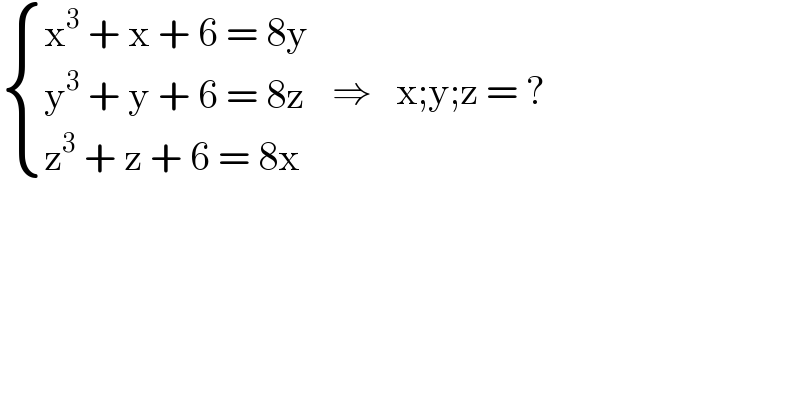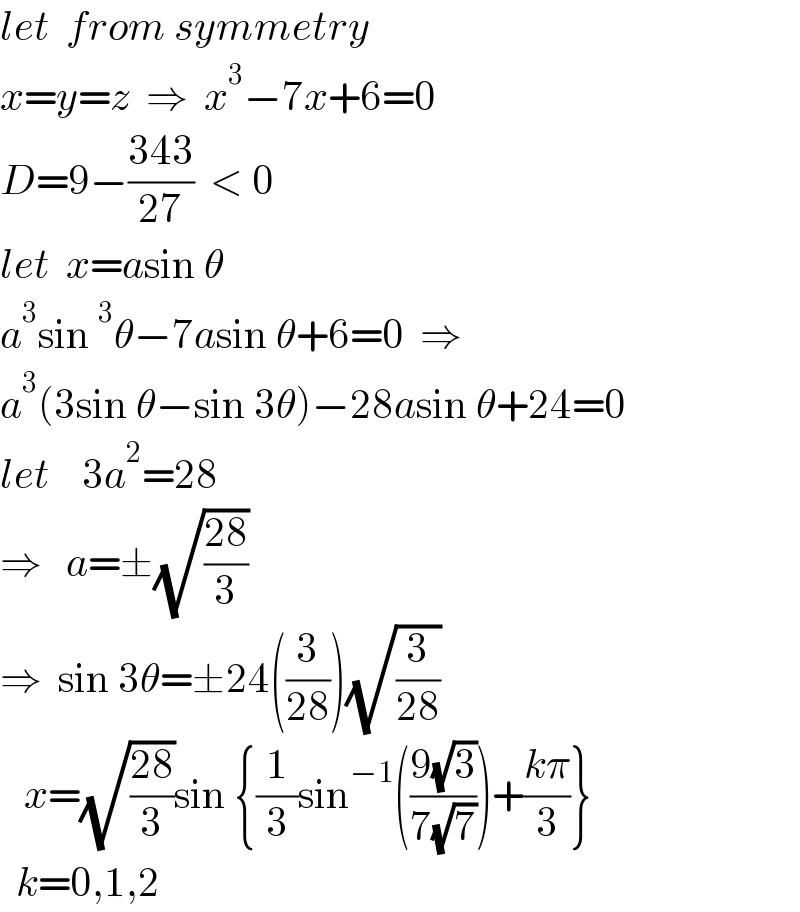Question Number 163906 by HongKing last updated on 11/Jan/22

$$\begin{cases}{\mathrm{x}^{\mathrm{3}} \:+\:\mathrm{x}\:+\:\mathrm{6}\:=\:\mathrm{8y}}\\{\mathrm{y}^{\mathrm{3}} \:+\:\mathrm{y}\:+\:\mathrm{6}\:=\:\mathrm{8z}}\\{\mathrm{z}^{\mathrm{3}} \:+\:\mathrm{z}\:+\:\mathrm{6}\:=\:\mathrm{8x}}\end{cases}\:\:\:\Rightarrow\:\:\:\mathrm{x};\mathrm{y};\mathrm{z}\:=\:? \\ $$
Answered by ajfour last updated on 11/Jan/22

$${let}\:\:{from}\:{symmetry} \\ $$$${x}={y}={z}\:\:\Rightarrow\:\:{x}^{\mathrm{3}} −\mathrm{7}{x}+\mathrm{6}=\mathrm{0} \\ $$$${D}=\mathrm{9}−\frac{\mathrm{343}}{\mathrm{27}}\:\:<\:\mathrm{0} \\ $$$${let}\:\:{x}={a}\mathrm{sin}\:\theta \\ $$$${a}^{\mathrm{3}} \mathrm{sin}\:^{\mathrm{3}} \theta−\mathrm{7}{a}\mathrm{sin}\:\theta+\mathrm{6}=\mathrm{0}\:\:\Rightarrow \\ $$$${a}^{\mathrm{3}} \left(\mathrm{3sin}\:\theta−\mathrm{sin}\:\mathrm{3}\theta\right)−\mathrm{28}{a}\mathrm{sin}\:\theta+\mathrm{24}=\mathrm{0} \\ $$$${let}\:\:\:\:\mathrm{3}{a}^{\mathrm{2}} =\mathrm{28} \\ $$$$\Rightarrow\:\:\:{a}=\pm\sqrt{\frac{\mathrm{28}}{\mathrm{3}}} \\ $$$$\Rightarrow\:\:\mathrm{sin}\:\mathrm{3}\theta=\pm\mathrm{24}\left(\frac{\mathrm{3}}{\mathrm{28}}\right)\sqrt{\frac{\mathrm{3}}{\mathrm{28}}} \\ $$$$\:\:\:{x}=\sqrt{\frac{\mathrm{28}}{\mathrm{3}}}\mathrm{sin}\:\left\{\frac{\mathrm{1}}{\mathrm{3}}\mathrm{sin}^{−\mathrm{1}} \left(\frac{\mathrm{9}\sqrt{\mathrm{3}}}{\mathrm{7}\sqrt{\mathrm{7}}}\right)+\frac{{k}\pi}{\mathrm{3}}\right\} \\ $$$$\:\:{k}=\mathrm{0},\mathrm{1},\mathrm{2} \\ $$
Commented by mr W last updated on 11/Jan/22

$${not}\:{just}\: \\ $$$$\left({x}−\mathrm{1}\right)\left({x}−\mathrm{2}\right)\left({x}+\mathrm{3}\right)=\mathrm{0}\:\:? \\ $$
Commented by ajfour last updated on 11/Jan/22

$$\Rightarrow\:\:{x}^{\mathrm{3}} −\mathrm{7}{x}+\mathrm{6}=\mathrm{0} \\ $$$${yes}\:{for}\:{sure}. \\ $$
Commented by mr W last updated on 11/Jan/22

$${indeed} \\ $$$${x}=\sqrt{\frac{\mathrm{28}}{\mathrm{3}}}\mathrm{sin}\:\left\{\frac{\mathrm{1}}{\mathrm{3}}\mathrm{sin}^{−\mathrm{1}} \left(\frac{\mathrm{9}\sqrt{\mathrm{3}}}{\mathrm{7}\sqrt{\mathrm{7}}}\right)+\frac{{k}\pi}{\mathrm{3}}\right\}=\mathrm{1},\mathrm{2},−\mathrm{3} \\ $$
